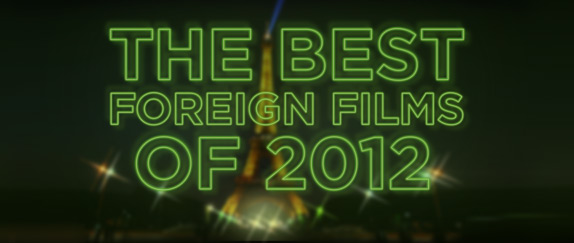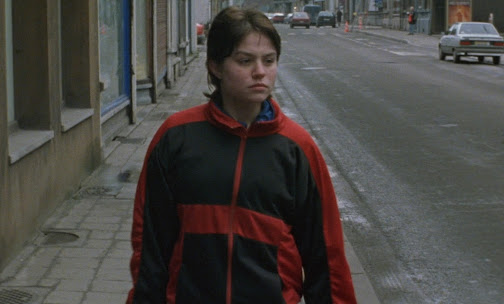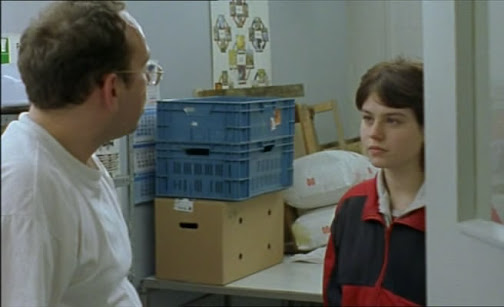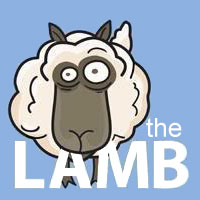Rosetta (1999)

Genre: Drama
Director: Jean-Pierre and Luc Dardenne
Starring: Émilie Dequenne
Language: French
Duration: 95 min.
Summary:
A poor young woman's struggle to hold on to a job in order to support herself and her alcoholic mother.

Rosetta is a film directed by Belgian brothers Jean-Pierre and Luc Dardenne. It premiered at the 1999 Cannes Film Festival, where a David Cronenberg led jury awarded it the Palme d'Or, in addition to a Best Actress award for first timer Émilie Dequenne, who shared the honor with Séverine Caneele in Bruno Dumont's Humanity.
This is a film the Dardenne brothers have described in interviews as being a war movie. There are no bullets or bombs, but right from the sudden and disorienting opening sequence we are thrown into the midst of an intense battle. Here the intrusive camera follows as unnaturally close as possible to its subject, a young woman dressed in a white uniform, frantically moving through the bland hallways of a factory of some kind.
There's no musical cue nor thundering score, but the sense of urgency is communicated all the same. Where is she going, is she being chased, or is she doing the stalking? It takes a few moments for the audience to figure out what's going on, and all the while the camera stays glued to her back, without the expected reaction shots or reverse angles, the only cuts in action occur because she's forcefully slammed the door on the camera operator behind her.
Young Rosetta has just been let go from her job. Not because of poor performance or any kind of trouble. It's simply because her trial period is over, and she's desperately trying in futile to stay and work her shift. This is because she dreads returning jobless back to the run down trailer park where she lives with her alcoholic mother (Anne Yernaux). It eventually takes two burly police officers to force her out of the locker room where she's locked herself in, but it's been one staggering introduction to the film and its scrappy protagonist.
No backstory is given, but you get the sense that life used to be better for Rosetta and her mother. She has a strong sense of pride, always waiting for the bus to drive off before darting across the highway, then cutting through the forest to get home lest she be seen heading towards the trailer park; and we see her later chastising her mother for putting plants in the garden, for she doesn't plan on them staying there long enough for them to sprout. This is only a temporary situation, if only she could find herself a stable job.
For the remainder of the film, cinematographer Alain Marcoen's camera never once leaves the close proximity of Rosetta's personal space. Capturing her every move with a raw intimacy that makes the viewer basically a part of the action. We follow her on her daily routine: visiting second hand stores to sell off the clothes that her mother mends for next to nothing, searching and hoping for any available job opening along the way, stopping to get a waffle and beer, fishing in a muddy river with a broken milk bottle. In the periphery we get glimpses of the perpetually grey and dreary suburbs of Liège, but it's Rosetta who dominates every shot.
Although Dequenne has since grown up to become a glamorous film starlet, her unblossomed visage is scruffy and determined here, caught somewhere between adolescence and adulthood. She looks feral yet presentable, a mixture perfect for the role. Her performance is incredible yet at times very difficult to watch. Precisely because she is able to exhibit so much anguish and despair, not only with her facial expressions but also in each and every mannerism which come across so real and natural. Even when she's doubled over in pain from an undisclosed stomach ailment, or so very awkwardly learning to dance for the first time, we just can't look away. It is a solid performance from start to finish, however the last few minutes of the film in particular are some of the most compelling and emotional scenes ever performed.
The film has no external music, but the soundtrack still plays a vital role in the story. The unfiltered sounds of the city, the speeding traffic and general noise echoing from every direction help to put us in Rosetta's frame of mind. Later, the buzz of a two stroke engine, hum of a hair dryer, wind seeping through a window crack, and the hissing of a gas stove each individually herald significant moments.
This isn't an ambitious production, it's simple, minimalistic, and comes from an extremely personal and restricted point of view, but that's exactly what the Dardenne brothers are the masters of. It's a demonstration of their unmatched ability to realistically capture the human condition on screen, and of their remarkable talent for coaxing unforgettable performances from young unknown actors. A rare and important masterpiece fully deserving of all the accolades.
*This is an expanded rewrite of a post originally published on December 27, 2010.
This is a film the Dardenne brothers have described in interviews as being a war movie. There are no bullets or bombs, but right from the sudden and disorienting opening sequence we are thrown into the midst of an intense battle. Here the intrusive camera follows as unnaturally close as possible to its subject, a young woman dressed in a white uniform, frantically moving through the bland hallways of a factory of some kind.
There's no musical cue nor thundering score, but the sense of urgency is communicated all the same. Where is she going, is she being chased, or is she doing the stalking? It takes a few moments for the audience to figure out what's going on, and all the while the camera stays glued to her back, without the expected reaction shots or reverse angles, the only cuts in action occur because she's forcefully slammed the door on the camera operator behind her.
Young Rosetta has just been let go from her job. Not because of poor performance or any kind of trouble. It's simply because her trial period is over, and she's desperately trying in futile to stay and work her shift. This is because she dreads returning jobless back to the run down trailer park where she lives with her alcoholic mother (Anne Yernaux). It eventually takes two burly police officers to force her out of the locker room where she's locked herself in, but it's been one staggering introduction to the film and its scrappy protagonist.
No backstory is given, but you get the sense that life used to be better for Rosetta and her mother. She has a strong sense of pride, always waiting for the bus to drive off before darting across the highway, then cutting through the forest to get home lest she be seen heading towards the trailer park; and we see her later chastising her mother for putting plants in the garden, for she doesn't plan on them staying there long enough for them to sprout. This is only a temporary situation, if only she could find herself a stable job.
For the remainder of the film, cinematographer Alain Marcoen's camera never once leaves the close proximity of Rosetta's personal space. Capturing her every move with a raw intimacy that makes the viewer basically a part of the action. We follow her on her daily routine: visiting second hand stores to sell off the clothes that her mother mends for next to nothing, searching and hoping for any available job opening along the way, stopping to get a waffle and beer, fishing in a muddy river with a broken milk bottle. In the periphery we get glimpses of the perpetually grey and dreary suburbs of Liège, but it's Rosetta who dominates every shot.
Although Dequenne has since grown up to become a glamorous film starlet, her unblossomed visage is scruffy and determined here, caught somewhere between adolescence and adulthood. She looks feral yet presentable, a mixture perfect for the role. Her performance is incredible yet at times very difficult to watch. Precisely because she is able to exhibit so much anguish and despair, not only with her facial expressions but also in each and every mannerism which come across so real and natural. Even when she's doubled over in pain from an undisclosed stomach ailment, or so very awkwardly learning to dance for the first time, we just can't look away. It is a solid performance from start to finish, however the last few minutes of the film in particular are some of the most compelling and emotional scenes ever performed.
The film has no external music, but the soundtrack still plays a vital role in the story. The unfiltered sounds of the city, the speeding traffic and general noise echoing from every direction help to put us in Rosetta's frame of mind. Later, the buzz of a two stroke engine, hum of a hair dryer, wind seeping through a window crack, and the hissing of a gas stove each individually herald significant moments.
This isn't an ambitious production, it's simple, minimalistic, and comes from an extremely personal and restricted point of view, but that's exactly what the Dardenne brothers are the masters of. It's a demonstration of their unmatched ability to realistically capture the human condition on screen, and of their remarkable talent for coaxing unforgettable performances from young unknown actors. A rare and important masterpiece fully deserving of all the accolades.
*This is an expanded rewrite of a post originally published on December 27, 2010.
— Bonjour Tristesse





























16 comments:
sounds pretty cool!
It's really something special, the camera is shaky at moments, but that the brothers' style
Yeah, that up close invasion of personal space, 'third-person shooter' tracking shot of theirs is really jarring the first time you see it, but it has such a powerful impact. So intimate yet also so distant.
I really enjoyed reading this post, I was just wondering do you trade featured blog posts. Thanks for sharing your Blog with others.
holy shnikes man. an ex-gf actually had me watch this years ago. i distinctly remember the whole grand canyon trailer park deal (not much else tho!). really crazy movie if you are into that kind of drama. you see some that shit that definitely makes you go mmmm???
Looks like an interesting flick, I'll have to check it out. Thanks for the review.
Hey Jim, what is the URL of your blog?
I'd describe it more as a human flick.
Thank you Classy for coming by and reading the blog. I hope you find some films that you like.
looks like a chick flick, but thanks anyways
It's been a while since I wanted to get to this one but I still haven,t find the courage because a Dardenne film is always very challenging just like a Bresson... Nice write up BT!
Great review, I watched Rosetta earlier in year, and you noticed a few nuances that I missed. I don't remember seeing this actress in anything else, she displayed a lot of potential here.
I failed to mention it in the review. It was already getting longer than I like, but this film actually resembles Bresson's Mouchette in many ways.
Thanks. This was my third time seeing it, and every time I notice some new detail.
I've seen quite a few of Dequenne's subsequent films, and for the most part they are unremarkable. Lots of romantic comedies and fluff like that. But she won Best Actress again in Cannes (Un Certain Regard) this year, for "Our Children". Looking forward to seeing that. It's also just been selected as Belgium's entry to the 2013 Oscars.
My first entry to Dardenne Brothers,your last paragraph sums up everything I want to say about their works,good job,BT!
This film was my introduction to them as well. It was an instant favorite and prompted me to immediately find the rest of their work. I still haven't seen their really early documentaries, but their features from La Promesse onwards are all excellent.
Post a Comment